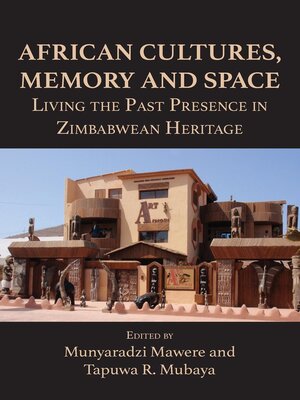Mawere
ebook ∣ African Cultures, Memory and Space: Living the Past Presence in Zimbabwean Heritage
By Munyaradzi Mawere

Sign up to save your library
With an OverDrive account, you can save your favorite libraries for at-a-glance information about availability. Find out more about OverDrive accounts.
Find this title in Libby, the library reading app by OverDrive.



Search for a digital library with this title
Title found at these libraries:
| Library Name | Distance |
|---|---|
| Loading... |
African Cultures, Memory and Space is an impeccable volume that powerfully grapples with a gamut of cultural heritage issues, challenges and problems from a vista of inter- and multi-disciplinary approach. The book, which is designed as a foundational text to the study of culture in ever-changing environments, makes an important argument that the dynamism of culture in highly globalised societies such as that of Zimbabwe can be studied from any perspective, but most importantly through careful examination of cultural elements such as memory, oral history and space, among others. While the book makes special reference to Zimbabwe, it profoundly and audaciously dissect and cut across different geographical and cultural spaces through its penetrating interrogation and scrutiny of different issues commonplace in many African contexts and even beyond. The book, written by scholars from different backgrounds and orientations, should appeal to scholars, researchers and students from various disciplines which include but not limited to Cultural Heritage Studies, Policy Studies, Social-Cultural Anthropology, Sociology, Development Studies and African Studies.|African Cultures, Memory and Space is an impeccable volume that powerfully grapples with a gamut of cultural heritage issues, challenges and problems from a vista of inter- and multi-disciplinary approach. The book, which is designed as a foundational text to the study of culture in ever-changing environments, makes an important argument that the dynamism of culture in highly globalised societies such as that of Zimbabwe can be studied from any perspective, but most importantly through careful examination of cultural elements such as memory, oral history and space, among others. While the book makes special reference to Zimbabwe, it profoundly and audaciously dissect and cut across different geographical and cultural spaces through its penetrating interrogation and scrutiny of different issues commonplace in many African contexts and even beyond. The book, written by scholars from different backgrounds and orientations, should appeal to scholars, researchers and students from various disciplines which include but not limited to Cultural Heritage Studies, Policy Studies, Social-Cultural Anthropology, Sociology, Development Studies and African Studies.







